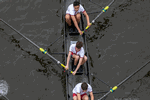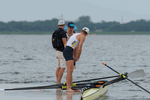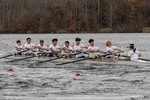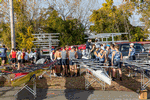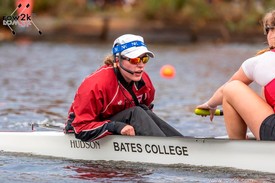Coaching Education & Development, Part 1
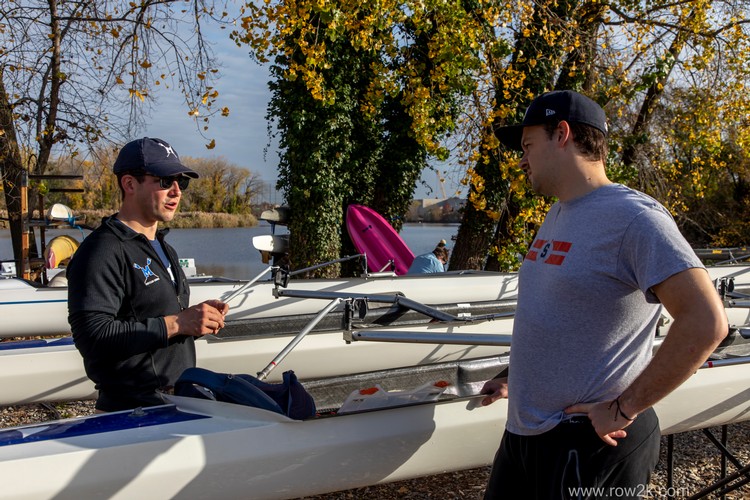
To learn more about this series and see the topics we plan to cover, please visit the Youth Coaches Corner's index page. Youth coaches are more than welcome to contact row2k to get involved in future columns.
This week, the first batch of answers we received to our questions about Coaching Education and Development:
What resources do you use for your own coaching development?
ANONYMOUS - WOMEN'S HEAD COACH
I turn to many different resources to develop my own coaching, especially since I’m still early in my coaching career. The greatest help has been working with my assistant coaches and the coaches in our boys’ program. We have a great coaching team with a ton of knowledge, and I feel very lucky to have worked with them and to have leaned on them for advice. On the other hand, I also watch a lot of YouTube videos of college practices to see what drills and style they’re working on, and I do some random googling for specific drills or skills that I need to develop.
KIRSTEN ANDERSON - ORLANDO AREA ROWING - DIRECTOR OF ROWING
Resources online and just watching rowing and my fellow coaches. There is so much available to us, you just have to put in some time to review it all. I try to focus on one thing to develop at a time, otherwise it can be overwhelming.
CORY SANDERSON - NASHVILLE ROWING - VARSITY MEN
Since I started as a high school teacher (in studio art), I tend to be an information sponge and I think it's exciting to find new things and parallels between facets of my life. For better or for worse, the internet is a bottomless pit of information and I think I learn as much of what not to do as things I would want to implement there.

Books, Podcasts, other coaches (and not just in rowing), and teachers I've worked with over the years are all resources I engage regularly. I don't have as much time as I would like to read, and do things like take classes, but most of the time that I'm in the car to and from meetings and practice I'm listening to a podcast or talking on the phone with someone since listening is always an easy way to consume information!
CHRIS RICKARD - JACKSON/REED HS - VARSITY WOMEN
The best resource I’ve found is talking to other coaches. Whether they’re more experienced or not, everyone has a different perspective on the stroke and team building, etc. Any chance you get to expand your horizons, challenge your assumptions and think through new approaches is an opportunity for growth.
KIRSTEN PRESKENIS - FARMINGTON HS - VARSITY WOMEN
I get most of my coaching development done during the off-season. I’ll attend online lectures, read articles, or listen to podcasts. I’ll also scull quite a bit in my single. I’ll test out drills and new workouts for the team. Trying out the drills myself gives me a valuable perspective for later teaching it.
Who do you go to for questions about coaching?
CORY SANDERSON - NASHVILLE ROWING - VARSITY MEN
I'm lucky to have a large network of coaches that I reach out to from all levels in the scholastic, club, college, national team, and club admin side depending what I'm looking for. One of the best parts of working with the Junior National Team for the last 10 years is the connections I've made with so many different coaches from different types of programs. What works for one at a college, vs another club, vs a high school all varies, but it's nice to be able to build that Venn diagram and find the overlap, or honestly where they differ, too. I wish there were more opportunities to be in the same place at the same time outside of regattas, but any opportunity is a good one.
Obviously if it's rowing specific--i.e. technique or rigging or something of that nature--I'm going to rowing coaches, but I've been lucky to coach football, wrestling, baseball, strength and conditioning, and swimming in addition to rowing over the years, and I pull a lot from former colleagues and people in other sports. I find myself dipping into my wrestling experience and mentors often, as it's one of the only other places I've found as mentally challenging as rowing.

KIRSTEN PRESKENIS - FARMINGTON HS - VARSITY WOMEN
Most often, I’ll talk with other coaches on our team. There’s a good chance they’re seeing something that I’m not. I also have mentors outside of the program that I’ll speak with.
In areas where there is not a lot of rowing, or availability of rowing people, what are strategies for developing coaches for your program?
CHRIS RICKARD - JACKSON/REED HS - VARSITY WOMEN
I do a fair amount of reading books on coaching, teaching, leadership, etc. And I try to be my biggest critic and always question how I could be doing something better. And I read Row2k articles!
CORY SANDERSON - NASHVILLE ROWING - VARSITY MEN

We experience this A LOT in Nashville, and we have been lucky for people to move here, or be here, for reasons other than rowing, with great past experience.
Outside of those folks, it's a commitment to believing that people with high enthusiasm and drive to learn can turn into great teachers themselves. To that end we have had great success with young alumni of our program coming on as assistant and development coaches. They understand the expectations, they have some investment in seeing our programs succeed, and even if they don't know a ton from the launch side, they have heard us coach them for years in some cases. Being willing to work collaboratively, absorb a lot of information, and ask questions when they don't know what to do has allowed us to develop young coaches quickly into great contributors at Nashville Rowing.
KIRSTEN ANDERSON - ORLANDO AREA ROWING - DIRECTOR OF ROWING
Regular meetings and conversations about what we are doing. Encouraging our coaches to have launch parties occasionally really helps to get them listening to each other.
What are your top tips for recruiting or retaining coaches for your program?
CORY SANDERSON - NASHVILLE ROWING - VARSITY MEN
Be willing to take on a great person, and help them learn to become a great coach. Years of experience do not always fill the puzzle piece that's open. With that in mind, I think being open to collaboration and input from fresh eyes and ears is important, too. It's easy to get used to doing things the way you've always done them, and sometimes it takes someone new pointing out possibilities to continue evolving.
Incorporating everyone into the process makes people feel like they are valuable as well. There's a difference between delegating tasks so we can divide and conquer as a team, and dumping the stuff you don't want to do on folks just because they are new or might be the assistant coach. I would wager that the latter of those two leads to much higher turnover.

If you enjoy and rely on row2k, we need your help to be able to keep doing all this. Though row2k sometimes looks like a big, outside-funded operation, it mainly runs on enthusiasm and grit. Help us keep it coming, thank you! Learn more.
Comments | Log in to comment |
There are no Comments yet
| |
- Bont Rowing
- Calm Waters Rowing
- Concept 2
- Craftsbury Sculling
- The Crew Classic
- CrewLAB
- Croker
- Dad Vail Regatta
- Durham Boat Co.
- Empacher
- Faster Masters
- Filippi
- Fluidesign
- h2row.net
- HUDSON
- Live2Row Studios
- Nielsen-Kellerman
- Oak Ridge RA
- Peinert Boat Works
- Pocock Racing Shells
- Race1 USA
- RowKraft
- Rubini Jewelers
- Vespoli USA
- WinTech Racing
- Bont Rowing
- Calm Waters Rowing
- Concept 2
- Craftsbury Sculling
- The Crew Classic
- CrewLAB
- Croker
- Dad Vail Regatta
- Durham Boat Co.
- Empacher
- Faster Masters
- Filippi
- Fluidesign
- h2row.net
- HUDSON
- Live2Row Studios
- Nielsen-Kellerman
- Oak Ridge RA
- Peinert Boat Works
- Pocock Racing Shells
- Race1 USA
- RowKraft
- Rubini Jewelers
- Vespoli USA
- WinTech Racing



